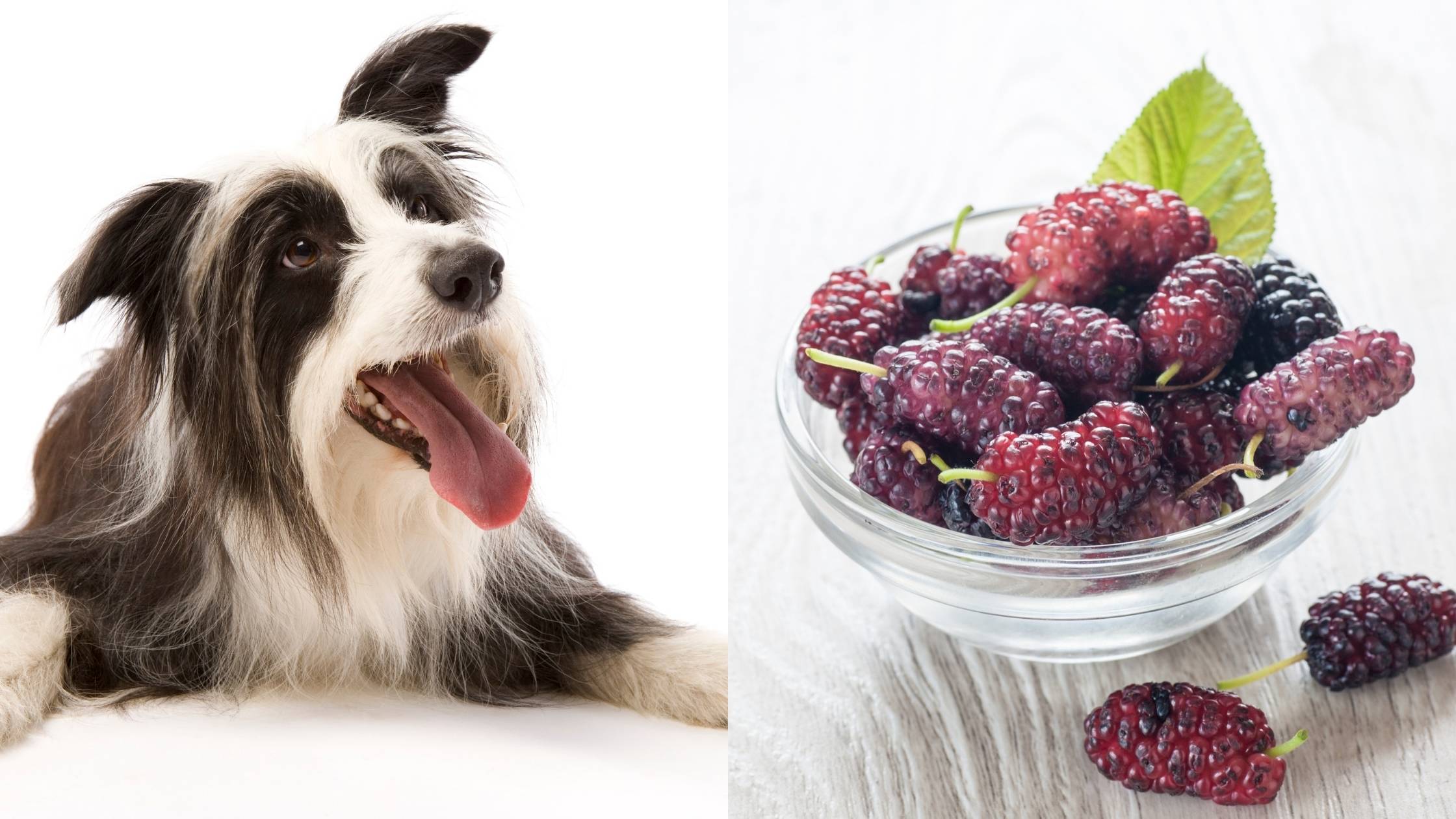Last Updated on 11/17/2021 by Veronica Jones
As a pet parent you want the best for your pup and to protect them from harm wherever possible.
Mulberries are a superfood berry that grows everywhere. Before you know it they have taken over entire corners of your garden, making it hard to keep your pooch away from them. Can dogs eat mulberries? Are they safe for dogs?
This article gives you all the information you need about dogs and mulberries.
What are mulberries?
Mulberries are the fruits from mulberry trees and part of the fig and breadfruit family that originates from China. Mulberries are either black, white or red and are typically made into jam, wine, fruit juice or eaten as a snack.
These berries are a healthy snack that are low in salt and fat. Mulberries are a good source of protein and iron and rich in vitamin C and vitamin K.
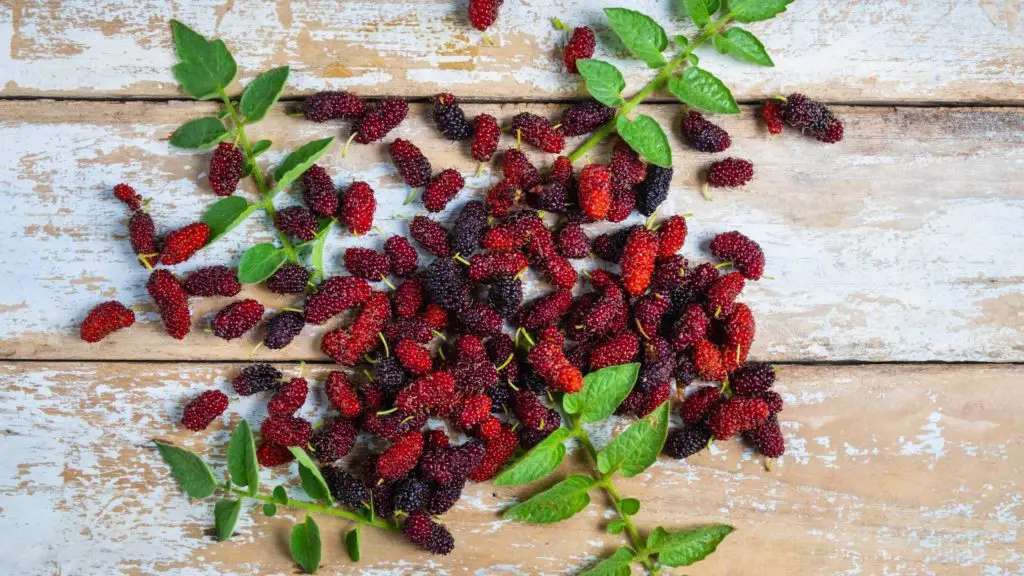
Can dogs eat mulberries?
Yes, mulberries are not considered toxic to dogs. However, you should only feed your pup ripe mulberries to allow them to travel easily through the digestive system and avoid giving them too many as this could cause diarrhea.
Should you feed your dog mulberries? Mulberries can provide several health benefits to canines if eaten in small amounts.
What benefits do mulberries have for dogs?
Mulberries are a great low-calorie treat for dogs. They contain important nutrients including fiber, iron and vitamin C.
If eaten in moderation, other benefits for dogs include:
Good source of antioxidants – antioxidants are an essential part of a dog’s diet because they protect from oxidation, which is the damage caused by free radicals. If free radicals are not removed from your dog’s body safely then can cause health problems such as arthritis or joint problems. Resveratrol is an antioxidant present in mulberries that fights against aging in both animals and humans.
Boost the digestive system – mulberries contain soluble and insoluble fibers that help keep the digestive system functioning well. For the same reason, too many mulberries can cause the digestive system to work too well, resulting in diarrhea.
Maintains healthy bones – the calcium, vitamin K, magnesium and phosphorus present in mulberries help your pet to maintain a healthy skeleton. Healthy bones help pups to recover after being injured.
Brain repair and protection – mulberries can even aid the repair of brain cells, helping your dog learn new things, understand commands and enhance their lifestyle and abilities as they grow older.
Enhanced blood circulation – the iron found in mulberries boosts the production of red blood cells, ensuring that oxygen reaches every cell and muscle.
Help fight types of cancer – mulberry fruit contains a chemical called anthocyanins, which is known for preventing tumors, especially ones found in the gastrointestinal tract. This type of cancer is rare in dogs, however it’s another benefit to giving your pet mulberries.
Prevents obesity – obesity is a serious health concern for dogs and it can be hard to reverse the excess gained weight. Mulberries are a low-calorie choice of snack that can help control the glucose level in your dog’s body. They also help to reduce fatty acids, which reduces overall body weight.

How many mulberries can dogs eat?
Too many mulberries can cause an upset stomach so no more than a handful of mulberries should be given to your pup at one time. This juicy fruit can be given a few times per week as a delicious snack or treat.
When you introduce dogs to new foods, you should do so gradually and observe their reaction. Although it’s unlikely that canines will have an allergic reaction to mulberries, it’s important that you check for any of the following signs, which could indicate an allergy:
• Red or itchy skin
• Coughing, sneezing or wheezing
• Discharge from the eyes or nose
• Vomiting
• Diarrhea
If you think your pet is having an allergic reaction to mulberries or any other new food, you should contact your veterinarian immediately for advice.
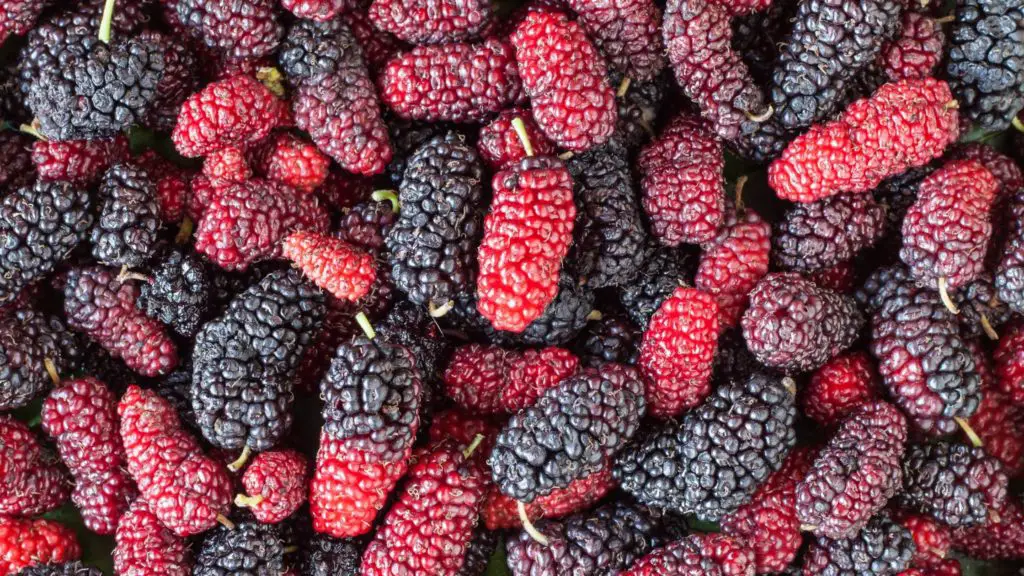
Can mulberries be poisonous?
Are mulberries poisonous to dogs? Can dogs get sick from eating mulberries?
Mulberries are not poisonous and it’s a good idea to let your dog eat mulberries occasionally, however eating too many of them can cause a dog to have diarrhea.
Unripe mulberries are hallucinogenic to both humans and dogs and should be consumed. As mulberries ripen the chemicals that cause hallucinations change, making them much safer to eat.
Whilst not harmful, be mindful that mulberry juice will stain fur, muzzles and paws. To avoid a scrub in the tub after eating mulberries, try to avoid letting your dog walk in areas where there are fallen mulberries.
Can dogs eat mulberry leaves?
If you notice your dog munching on some mulberry leaves, don’t panic. The leaves on a mulberry bush will not harm your dog, however you should avoid letting your pup eat too many as they could cause indigestion issues when eaten in large quantities.

Can dogs eat dried mulberries?
Dried mulberries contain high levels of sugar, making them a calorie-heavy snack for dogs. Eating more sugar than a dog needs could put your dog at risk of diabetes, heart disease and obesity.
Can puppies eat mulberries?
Yes, puppies can safely eat mulberries too. Nutrition is crucial to the development of puppies, so what they eat influences their immune system and overall growth. Mulberries can feature in a pup’s diet in moderation. A growing puppy’s tummy may be more sensitive than a fully grown dog’s stomach, so only introduce one or two mulberries to start with. If your puppy experiences any diarrhea or sickness, avoid giving him any more mulberries.
How to serve mulberries to your pup?
The best way to give your four-legged friend mulberries is in their natural form. Pick some fresh mulberries from a mulberry bush and wash them thoroughly in water to remove any pesticides or herbicides that may be on the fruit.
Avoid adding sugar to mulberries that you give your dog as this will turn them into an unhealthy choice of snack. For the same reason, avoid cooking mulberries for your pup as you’ll need to cook them in something that isn’t safe or healthy such as butter, adding extra fat and calories and making it an unhealthy choice of snack.
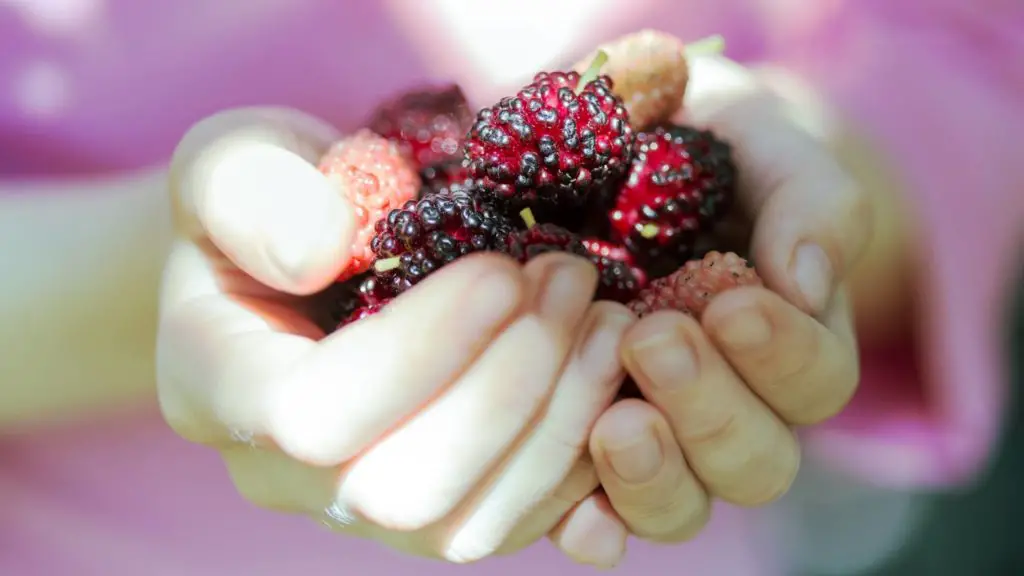
Variations of mulberries
There is more than one type of mulberry, and it’s important that pet owners know if they are safe for dogs to consume.
White mulberries – white mulberry trees are native to China and are known for being the main food source for silkworms. The berries are white or light green and are safe for humans and canines to consume. You will usually find white mulberries during April in the wild.
Black mulberries – the black mulberry tree is also native to China and produces berries that are safe for human and dog consumption between August to September. The berries are ready to be eaten when they start falling from the branches.
Red mulberries – red mulberries ripen in late spring and are safe to eat once fully ripened. Similar to other varieties of mulberries, unripe berries can cause hallucinations and should not be eaten by dogs or humans.
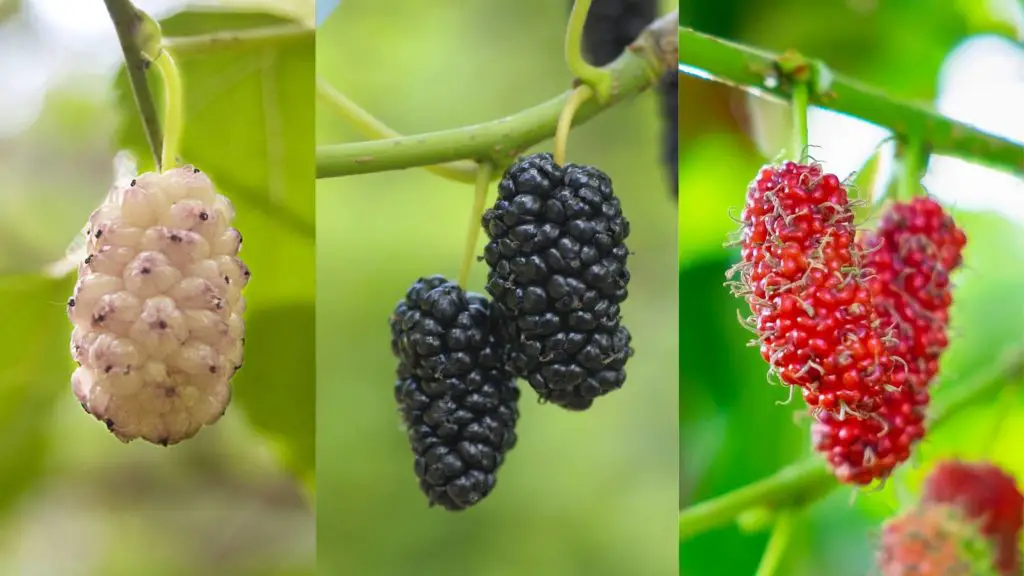
Toxic berries to avoid
Whilst mulberries won’t cause your dog any harm, several other berries will.
Juniper berries – you should prevent your dog from eating juniper berries as they contain mild toxins that can make a dog sick. If a few are consumed, your pooch may throw up or get diarrhea, however if eaten in large quantities this berry can cause kidney problems.
Mistletoe berries – mistletoe plants, including the leaves and berries contain toxins that can damage cells and cause hallucinations.
Cherries – the pit, stem and leaves of cherries contain cyanide, which is poisonous to dogs and can even be fatal if eaten in large amounts. Cherry pits can also cause intestinal blockages so it’s best to keep these out of reach of your dog’s paws and mouth.
Holly berries – the berries of a holly plant are toxic to dogs, but also other animals and children. The danger of holly berries is that they fall off onto the floor, which makes it hard for canines to resist.
Pokeberries – the pokeweed plant is highly poisonous to humans, dogs and other animals. Pokeberries, the leaves, stems, flowers and roots all contain saponins, phytolacca and oxalic acid toxins that can cause gastrointestinal upset, respiratory depression and even seizures.
Baneberries – the baneberry plant produces one of the most toxic berries to dogs, baneberries. Eating just a few of these small red berries can be fatal. Signs of baneberry poisoning include cardiovascular or neurovascular symptoms, blood in a canine’s urine, blisters or skin irritation.
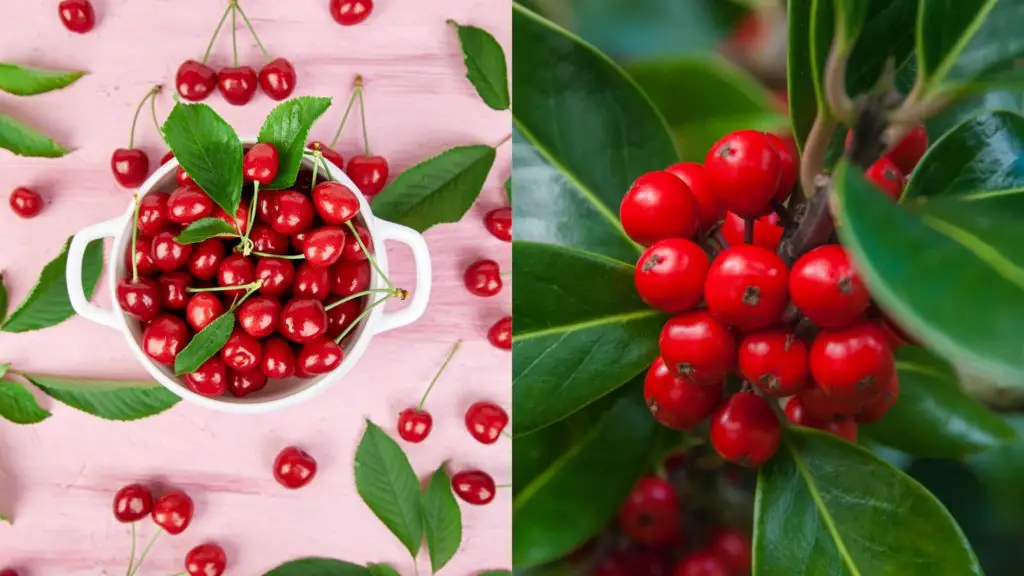
Symptoms of berry poisoning in dogs include:
• Difficulty breathing
• Drooling
• Abdominal pain
• Diarrhea
• Low blood pressure
• Vomiting
• Decreased heart rate
• Loss of appetite
Dogs and mulberries
It’s ok if your dog eats mulberries. Your pup can enjoy all varieties of ripe mulberries as an occasional treat, but they shouldn’t eat too many of them. Don’t worry if your pup decides to gobble up lots in one go before you can stop him though. The worst he will experience is a poorly tummy and a stained muzzle.

